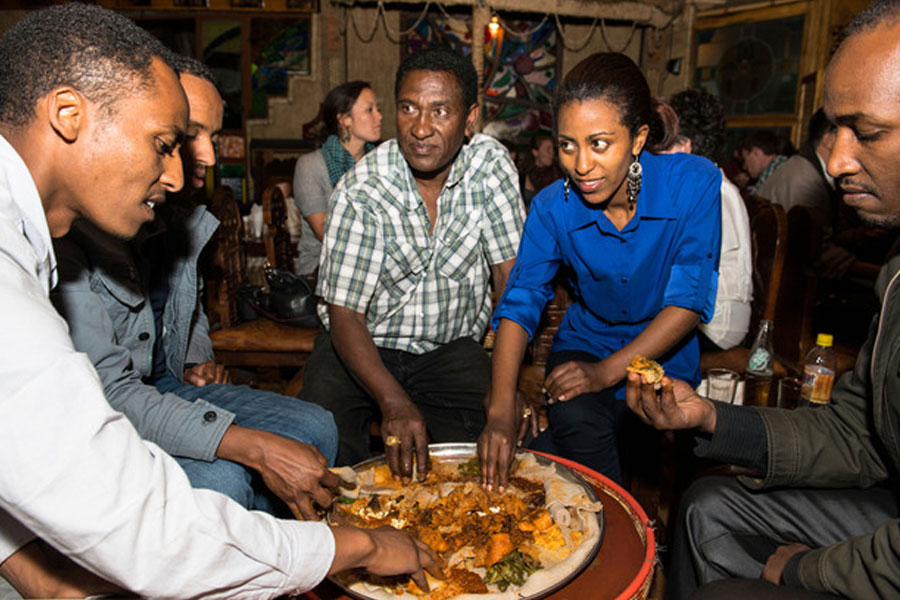
Fortune News | Aug 22,2020
Apr 8 , 2023
By Yonnas Kifle (PhD)
Ethiopia, a country with a diverse cultural and natural heritage, is grappling with a growing external debt burden that stood at 27 billion dollars in 2022, constituting over 23pc of its gross domestic product (GDP). Projections show that between 2023 and 2027, its national debt will rise by a staggering 82.4 billion dollars, reaching an estimated 134.65 billion dollars within five years.
This dire situation calls for a strategic response from the Ethiopian government, which must navigate the complexities of debt relief negotiations with its creditors, including the International Monetary Fund (IMF).
However, securing debt relief from the IMF often entails agreeing to policy recommendations that may prove to be double-edged swords.
The IMF might insist on fiscal consolidation measures, structural reforms, and changes to monetary policy, including interest and exchange rates. It may demand that the Ethiopian government implements spending cuts to social programs and adopts stringent austerity measures, asserting that such steps foster macroeconomic balances and long-term economic stability.
Notwithstanding these challenges, Ethiopia's negotiating strategy must prioritise the welfare of its citizens.
As the renowned economist John Maynard Keynes once observed, "in the long run, we are all dead." Consequently, the government's primary obligation should be to provide robust social safety nets, ensure public safety, protect individual rights, and expand access to education for all its people. Balancing these immediate imperatives with long-term sustainable economic development and addressing the external debt burden is crucial.
Ethiopia's negotiating team must ground its arguments in the country's unique needs and challenges to build a compelling case for debt relief. In addition to securing debt relief, the government must guarantee that borrowed funds are allocated to targeted projects without being misappropriated or used to support the lavish lifestyles of high-ranking officials, thereby ensuring tangible benefits for the populace.
Alongside fiscal responsibility, maintaining political stability and internal security is essential for safeguarding the rights of Ethiopians to live and work anywhere within the country without fear of displacement.
Ethiopia's rich human and natural resources can be harnessed to propel economic growth. The country boasts fertile arable land, minerals and precious metals, natural forests, and abundant water resources. By investing in education and training, Ethiopia can develop a skilled workforce capable of contributing to more advanced industries and products, fostering long-term sustainable economic growth.
The government can mobilise skilled Ethiopians to construct renewable power plants, transportation networks, and irrigation systems. These infrastructural developments can improve Ethiopians' quality of life and attract foreign investment, generating the export earnings necessary for servicing and repaying the country's external debt.
As Ethiopia's negotiating team seeks debt relief, it must formulate clear negotiation positions and goals. If need be, the team should not shy away from threatening to default on debt payments rather than subjecting its citizens to the extreme poverty that IMF-prescribed austerity measures could entail. Building alliances with other countries and organisations to bolster Ethiopia's negotiating stance is equally vital.
Given the country's wealth of resources and dynamic population, the Ethiopian government must prioritise the well-being of its people over the demands of IMF economists. Economic reform and sustainable growth should be pursued while preserving the safety and security of the populace and harnessing the country's resources. By adopting this approach, Ethiopia can overcome its external debt challenges and chart a course toward a brighter, more prosperous future for its citizens.
PUBLISHED ON
Apr 08,2023 [ VOL
24 , NO
1197]


Fortune News | Aug 22,2020

Radar | Oct 10,2020

Viewpoints | Jun 27,2020

Viewpoints | Jul 18,2020

Radar | Mar 07,2020

Viewpoints | Apr 02,2022

View From Arada | Feb 10,2024

My Opinion | Mar 30,2019

Viewpoints | Dec 19,2021

Viewpoints | Jun 21,2025

My Opinion | 131766 Views | Aug 14,2021

My Opinion | 128149 Views | Aug 21,2021

My Opinion | 126095 Views | Sep 10,2021

My Opinion | 123717 Views | Aug 07,2021

Dec 22 , 2024 . By TIZITA SHEWAFERAW
Charged with transforming colossal state-owned enterprises into modern and competitiv...

Aug 18 , 2024 . By AKSAH ITALO
Although predictable Yonas Zerihun's job in the ride-hailing service is not immune to...

Jul 28 , 2024 . By TIZITA SHEWAFERAW
Unhabitual, perhaps too many, Samuel Gebreyohannes, 38, used to occasionally enjoy a couple of beers at breakfast. However, he recently swit...

Jul 13 , 2024 . By AKSAH ITALO
Investors who rely on tractors, trucks, and field vehicles for commuting, transporting commodities, and f...

Jul 5 , 2025
Six years ago, Ethiopia was the darling of international liberal commentators. A year...

Jun 28 , 2025
Meseret Damtie, the assertive auditor general, has never been shy about naming names...

Jun 21 , 2025
A well-worn adage says, “Budget is not destiny, but it is direction.” Examining t...

Jun 14 , 2025
Yet again, the Horn of Africa is bracing for trouble. A region already frayed by wars...

Jul 6 , 2025 . By BEZAWIT HULUAGER
The federal legislature gave Prime Minister Abiy Ahmed (PhD) what he wanted: a 1.9 tr...

Jul 6 , 2025 . By YITBAREK GETACHEW
In a city rising skyward at breakneck speed, a reckoning has arrived. Authorities in...

Jul 6 , 2025 . By NAHOM AYELE
A landmark directive from the Ministry of Finance signals a paradigm shift in the cou...

Jul 6 , 2025 . By NAHOM AYELE
Awash Bank has announced plans to establish a dedicated investment banking subsidiary...